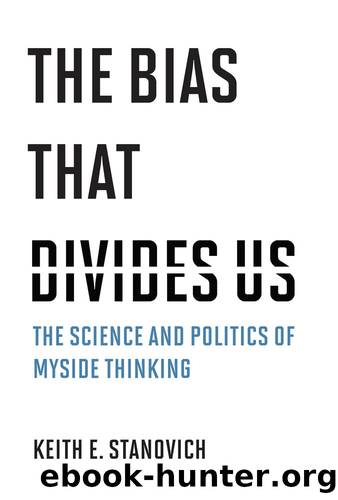The Bias That Divides Us by Keith E. Stanovich

Author:Keith E. Stanovich [Stanovich, Keith E.]
Language: eng
Format: epub
Tags: myside bias; motivated reasoning; confirmation bias; memes; epistemic rationality; expressive rationality; identity politics; political correctness; Bayesian reasoning; intelligence; bias blind spot
Publisher: MIT Press
The Great White Whale of the Cognitive Elites: Finding Deficiencies in Trump Voters
Despite the low yield of the psychological research attempting to link conservatism with negative psychological traits, the impetus to find such associations became magnified by the surprising US presidential election results of 2016. Trumpâs victory increased the myside bias blind spot among cognitive elites because it seemed to make them even more sure that their political opponents were cognitively deficient.
In September 2016, in collaboration with my colleagues Richard West and Maggie Toplak, I published The Rationality Quotient (Stanovich, West, and Toplak 2016), which described our attempt to create the first comprehensive test of rational thinking. Because the book is very much an academic volume, we had expected our academic peers to engage with its statistics and technical details, and they began to do just that soon after it was published.
But then the November 8, 2016, United States presidential election intervened.
The tone of the emails I was receiving suddenly changed to gallows humor or outright sarcasm, like âWow, youâll sure have a lot to study nowâ or âWe sure need your test now, donât we?â Many of these emails implied that I now had the perfect group to studyâTrump votersâwho were obviously irrational in the eyes of my email correspondents.
After the election, I also received many invitations to speak, several with the subtle (or sometimes not-so-subtle) implication that I surely would want to commentâafter first giving my technical talk, of courseâon the flawed rational thinking of the voters who had done this terrible thing to the nation. One European conference that solicited my participation had as its theme trying to understand the obviously deficient thinking not only of Trump voters, but of Brexit voters as well. The wordy conference prospectus clearly presumed that every educated person would view any opposition to increased globalization as obviously irrational. As the author of a rational thinking test, I was seen as the ideal candidate to give the imprimatur of science to this conclusion. No less insistent have been friends and relatives who assume that I am the perfect person to affirm their view that a substantial number of people who cast ballots for Trump were irrational in their thinking.
My correspondents certainly reflected the prevailing opinion among cognitive elites in both Europe and Americaâthat psychologically deficient and uninformed voters had endorsed disastrous outcomes that just happened to conflict with the views of the hypereducated (Fuller 2019). Certainly, subsequent to the 2016 election in the United States, high-caliber publications, from the Atlantic (Serwer 2017) to the New Republic (Heer 2016) to the Wall Street Journal (Stephens 2016), were nearly uniform in their relentless portrayal of Trump voters as âracist,â âsexist,â and âxenophobic.â Writing in Foreign Policy magazine, Jason Brennan (2016) informed us that âTrump owes his victory to the uninformedâ and that his victory was due to âthe dance of the dunces.â The agenda was sometimes baldly displayed, as in James Traubâs 2016 essay âItâs Time for the Elites to Rise Up against the Ignorant Masses.
Download
This site does not store any files on its server. We only index and link to content provided by other sites. Please contact the content providers to delete copyright contents if any and email us, we'll remove relevant links or contents immediately.
| Administration & Medicine Economics | Allied Health Professions |
| Basic Sciences | Dentistry |
| History | Medical Informatics |
| Medicine | Nursing |
| Pharmacology | Psychology |
| Research | Veterinary Medicine |
Bioenergetica by Alexander Lowen(1122)
Noise: A Flaw in Human Judgment by Sunstein Cass R. & Sibony Olivier & Kahneman Daniel(968)
The Data Detective by Tim Harford(940)
The Child in You by Stefanie Stahl(882)
Chatter by Ethan Kross(797)
The Science of Rapid Skill Acquisition by Peter Hollins(637)
Freedom by Sebastian Junger(630)
No Bad Parts by Richard C. Schwartz(600)
The Montessori Baby by Simone Davies(563)
Evolution Gone Wrong: The Curious Reasons Why Our Bodies Work by Alex Bezzerides(559)
The Quantum Psychiatrist: From Zero to Zen Using Evidence-Based Solutions Beyond Medication and Therapy by Biswas Dona(551)
Maps of Meaning: The Architecture of Belief by Jordan B. Peterson(549)
The Science of Self-Learning: How to Teach Yourself Anything, Learn More in Less Time, and Direct Your Own Education (Learning how to Learn Book 1) by Peter Hollins(519)
Anxiety For Dummies by Charles H. Elliott & Laura L. Smith(512)
Sadomasochism and the BDSM Community in the United States by Stephen K. Stein(497)
Disconnected by thomas Kersting(480)
Why Sex Doesn't Matter by Olivia Fane(480)
The Mechanics of Passions: Brain, Behaviour, and Society by Alain Ehrenberg(480)
Jung - The Key Ideas: Teach Yourself (TY Philosophy) by Ruth Snowden(467)
